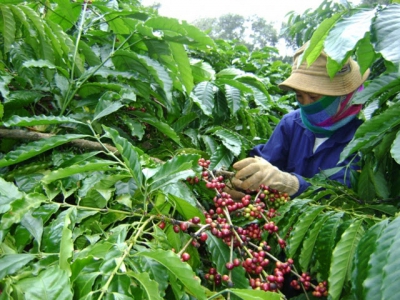Post-pandemic recovery brewing in Vietnams coffee sector

Despite the pandemic-induced production and export slowdown, Vietnam will endeavor to maintain its position as the world’s second biggest coffee producer and exporter, add value to its coffee products and improve incomes of 640,000 coffee farming households. To do so, the Vietnamese coffee industry will increase its presence in foreign supermarket chains through e-commerce while at the same time developing domestic sales.
The Vietnamese coffee industry will increase its presence in foreign supermarket chains through e-commerce while at the same time developing domestic sales
According to the Ministry of Agriculture and Rural Development, Vietnam has become one of the biggest coffee producers and the biggest producer of Robusta coffee in the world. Almost three billion cups of coffee are sold daily worldwide, 20 percent of which are prepared with Vietnamese coffee.
Since Vietnam joined the International Coffee Organization (ICO), the world coffee industry has experienced three crises. In 1991, when the ICO removed the quota system, the price of Arabica coffee decreased from US$4,000 to US$3,000 per tonne, while the price of Robusta coffee dropped to US$$400 per tonne in 2000 but reached US$1,300-1,400 per tonne in 2020.
Numerous coffee businesses and growers suffered losses. Seeking to overcome difficulties, they built long-term strategies, changed business methods and invested in processing to add value to coffee products.
Most coffee businesses have engaged in e-commerce, including participation in such international exchanges as Ice London and New York, and Vietnamese goods exchanges. Many private businesses set up websites to sell coffee online. Door-to-door coffee delivery and take-away services are also growing rapidly.
Coffee processing investment
Many businesses have invested in coffee processing development to meet the increasingly diversified consumer demand and export to markets, with which Vietnam has signed a free trade agreement (FTA). Previously, only foreign enterprises, including Nestle, Olam, Ca phe Ngon, and Tata, among others, invested in coffee processing. Nowadays, domestic companies also invest in instant coffee factories, including Tin Nghia Corporation and the Intimex Group, the An Thai Company and Viet My Company. Small-sized coffee bean roasting and grinding facilities catering for 10-20 café chains are developing rapidly.
After more than six months of research, Trung Nguyen Legend has officially launched the Trung Nguyen Legend Brand Store on Amazon, marking an important step in the company’s journey to export coffee through cross-border e-commerce. Discussing this strategic move, a representative of Trung Nguyen Legend stated, “Although the results are very encouraging, there is still a long way ahead, but we are confident. In the future, Trung Nguyen believes that e-commerce channels will flourish even more than today.”
The proportion of domestic coffee sales increased from three to 10 percent over the past five years. The rate is expected to increase to 25 percent in the next 15 years. Vietnam set a target of reaching a total coffee export value of US$5 billion in the next five to six years. In this regard, the country will increase the value of processed coffee exports from nearly US$400 million to US$2 billion and export coffee beans worth US$3 billion.
Related news
 Rice exports down in volume, up in price
Rice exports down in volume, up in price In the first months of the year, Vietnam’s rice exports volume decreased sharply compared to the same period in 2020.
 Việt Nam aims to reduce greenhouse gas emissions in rice sector
Việt Nam aims to reduce greenhouse gas emissions in rice sector Agencies in Việt Nam and international partners have been working together to seek effective measures to reduce the emission of greenhouse gases in rice product
 Local fruit, vegetable businesses seek to meet global demands
Local fruit, vegetable businesses seek to meet global demands The local fruit, vegetable processing sector must strive to improve quality in an effort to meet stringent requirements set by various import markets worldwide